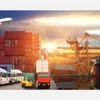[Product Roadmap] Heeding client feedback, how this supply chain SaaS startup developed solutions for logistical woes
In this week’s Product Roadmap, we feature Mumbai-based startup Elixia Tech Solutions, which provides software solutions for transportation, logistics, and supply chain management across industries.
Supply chain management is a tough nut to crack. From dealing with material scarcity to managing suppliers, the sector involves untangling logistical complexities and tackling various challenges, which heaped on amid the pandemic-induced disruption.
According to a survey done by EY, only 2 percent of companies surveyed said they were fully prepared for the pandemic. Serious disruptions affected 57 percent of the companies, with 72 percent reporting a negative effect (17 percent reported a significant negative effect and 55 percent mostly negative).
Nonetheless, 92 percent of the companies did not halt technology investments amidst the pandemic, while 60 percent said the pandemic increased their supply chain’s strategic importance.
Many companies are taking on the challenge and simplifying supply chain management for large enterprises.
One of them is Solutions founded by Sanket Sheth. Founded in 2011, the Mumbai-based startup provides software solutions for transportation, logistics, and supply chain management across industries. It raised $1 million in its Pre-Series A funding round led by RVCF (Rajasthan Venture Capital Fund) in September 2021.
This week on Product Roadmap, we chart the evolution of Elixia Tech–how it transformed from a telematics company to a supply chain control tower provider.

Elixia Tech - Tracking Dashboard
Telematics for the supply chain sector
From 2011 to 2016, Elixia Tech was operating as a telematics company in the supply chain space, helping large enterprises keep track of the movement of their goods.
“We were focused on giving visibility to customers stoppages, idle time, and delayed deliveries,” explains Sanket Sheth, Founder and Managing Director of Elixia Tech Solutions, in a conversation with YourStory.
The company rolled out Elixia Speed in 2011, which involved installing GPS devices and temperature probes in freight vehicles, pulling data, and analysing it.
In case of delays, or temperature or humidity irregularities, the product sent alerts to clients, which include the likes of Times Now, , Monginis Foods, and Coldstar–which were also one of Elixia Tech’s first clients. The solution was used by about 15,000 vehicles from 2011 to 2015.
Mondelez–the company that owns 5 Star, and Cadbury, among other chocolate brands–installed about 600 devices pan India in 2015-16.
While catering to the clients, Sanket realised that apart from visibility, the companies also wanted the entire supply chain process automated.
Elixia Tech began focusing on automation through a procure-to-pay model, starting with Mondelez. Two years later, it built the supply chain control tower in a procure-to-pay model and started acquiring customers by the end of 2017.

Elixia Tech Supply Chain Control Tower Overview
Supply chain control tower
According to Gartner, a supply chain control tower is created by combining people, processes, data, organisation, and technology to improve visibility, control and decision-making. Deloitte says that a control tower offers a dynamic end-to-end capability that enables strategic priorities, solves specific business issues, and delivers measurable benefits.
In simpler words, a control tower is an analytics platform that helps organisations ensure that their products reach the markets at an appropriate time and in the right quality, without any mishap.
While working on telematics, the Elixia team interacted with various supply chain heads and deduced that most of the supply chain process was manual, despite various tools being available to automate. This is because “most of what was available in the market were all working in silos and there was no control tower”, explains Sanket.
The high cost of logistics was also a problem. Sanket says that in India, it's about 14 percent high of the GDP, which is 8-9 percent in other countries. To put this in context, he shares that in the North American or European markets, this figure is always less than 10 percent.
In a mission to reduce cost, the company worked with its existing customers to reduce the supply chain cost using the supply chain control tower–called the Elixia Control Tower.
Supply chains focus on reducing the rate per tonne, rate per kg, or cost per kg. Using the control tower, the rate per tonne from, suppose, Rs 7,100 to Rs 6,000.
“This is what we have done for FMCG (fast-moving consumer goods) majors to help them continuously save costs,” he adds.
The control tower is split into three modules–pre-transit, in-transit, and post-transit.
The pre-transit module primarily focuses on planning–through a dispatch planner or distribution planner. This helps with identifying how many vehicles to procure and their type, as well as automatically allotting vehicles, thereby reducing costs due to vehicle utilisation.
This is followed by the transit module—Elixia Speed, which can track the shipment, determine whether there was a route violation, and how long will it take for the shipment to reach its destination.
The post-transit module takes care of billing and analytics. This consists of big data analytics to help the supply chain, catch any exceptions, if any, and also investigate in case of any issues.
These processes are bundled into a single platform, split into 12 features, namely—planning, allocation, consignor, tracking, consignee, warehouse, rate engine, billing, invoicing, analytics, fleet, and ticketing.

Elixia Tech - Vehicle Utlisation Dashboard
Future of the product
The company started its segment focused on sectors, including FMCG, pharma, logistics, and cold chain.
The company acquired a few customers for the first five years after the launch, and in 2018, it landed up in the top five in food loss validation conducted by Rabobank in Singapore.
Rabobank Asia, a global bank focused on food, agriculture, and sustainability, had launched the Food Loss Challenge Asia—an open innovation challenge for startups to present their agritech solutions to reduce food loss.
Now, the company offers an industry-agnostic solution used by large players such as Maersk, , Mondelez, , Sanofi, and –used across sectors such as FMCG, healthcare/pharma, 3PL, cold chain, oil and gas manufacturing, and automobile.
The company registered a revenue of Rs 7.53 crore for FY22, recording a 73 percent growth from FY21 at Rs 4.5 crore. It charges a flat transaction fee ranging from Rs 100 to 150.
The company saw tremendous growth after the coronavirus-led lockdown in 2020 due to the rise in digital adoption across various segments. Sanket says that before lockdown, his employees had close to 20 sale leads per day, but the pandemic-induced digital adoption gave rise to close to 60 sale leads a day. It has more than 1,500 customers using its platform.
“People started adopting technology as they started realising that in the case of such problems, it is always a good idea to digitalise the entire process,” he adds.
Elixia Tech is a 75-membered company, including close to 50 people in tech and also employs 40-50 contractual employees. With the investment raised last year, the company plans to scale up its presence in both domestic and international markets. It plans to go for a second round of funding in the coming months.
It also launched India’s first WhatsApp-driven, end-to-end tech-powered logistics marketplace–Elixia Connect–which provides shippers and transporters with a common platform to interact and negotiate to meet their on-ground logistics requirements.
Elixia Tech products are now used by an increasing number of clients across the globe. In 2021, its customer UPL used its platform in Brazil, due to which the company added Portuguese as one of the languages. Later, the company expanded its client base to include the Middle East, Egypt, Australia, and the UK.
Elixia Tech plans to launch a similar product for air and sea freights in Q2 of FY23, and for drones in Q4. With the drone solutions, it plans to enter the US and European markets.
“Our control tower is being used in all segments of logistics, and not just big vehicles, full truckloads or line hauls. It's also meant for distribution or last-mile delivery. Several customers are using this module and the control tab for different segments of logistics assets,” Sanket signs off.
(The copy was updated with a new feature image and the founder's surname.)
Edited by Kanishk Singh


![[Product Roadmap] Heeding client feedback, how this supply chain SaaS startup developed solutions for logistical woes](https://images.yourstory.com/cs/2/40d66ae0f37111eb854989d40ab39087/ImagesFrames67-1653562750833.png?mode=crop&crop=faces&ar=2%3A1&format=auto&w=1920&q=75)

![[Product Roadmap] From bootcamps to building deep tech, Camp K12 has evolved to make coding fun for children](https://images.yourstory.com/cs/2/a9efa9c02dd911e9adc52d913c55075e/Campk12-1652867957875.jpeg?fm=png&auto=format&h=100&w=100&crop=entropy&fit=crop)




